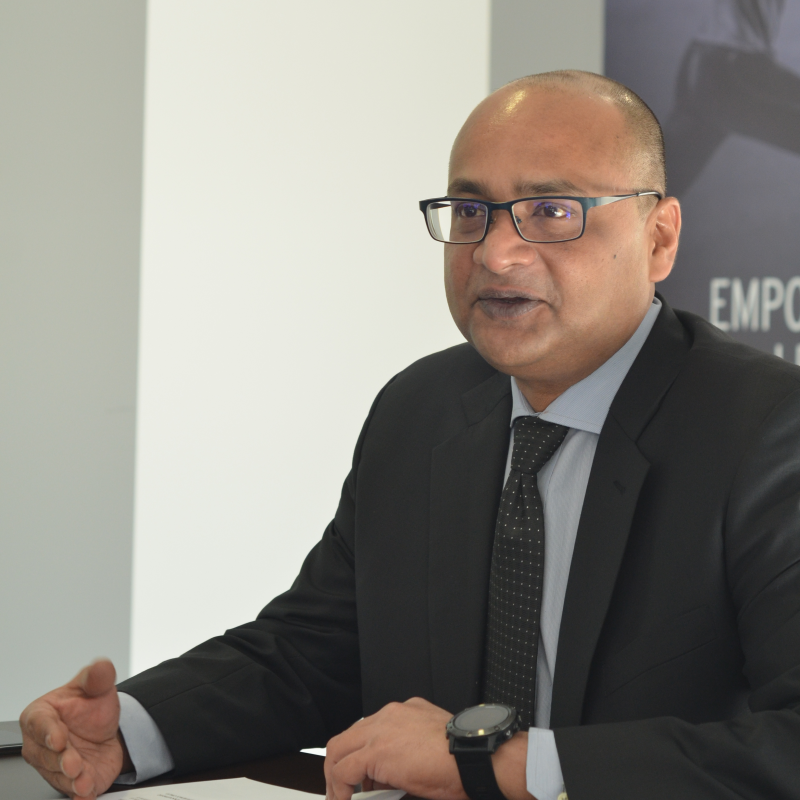 Suresh Pragasam,, regional general manager, Southeast Asia, Mundipharma Pharmaceutical
Suresh Pragasam,, regional general manager, Southeast Asia, Mundipharma PharmaceuticalHealthcare is fast shifting towards the digital age, with all stakeholders rushing to join the digital era. As major players in the healthcare industry, pharmaceutical companies are not spared the rush. MIMS Doctor speaks to Suresh Pragasam, regional general manager, Southeast Asia, Mundipharma Pharmaceutical, for his views on the uptake of technology and the digitization of healthcare and Mundipharma’s efforts to keep abreast with the trends.
Suresh believes the pharmaceutical industry has been late in embracing technology. Due to many factors, one of which is resistance to change, the pharmaceutical stakeholders have been hesitant in investing in technology, which would drastically change the delivery of healthcare. Suresh said there are plenty of ideas floating around but players hesitate to initiate or invest in new technology or ideas as they are worried about the venture failing. He said (in reference to a successful framework of digital health): “I think it is important that people look beyond the Return-on-Investment and keep trying. There will be a lot of failures before we find something which works.”
The expenditure on digital marketing accounts for the bulk of expenditure utilized by companies worldwide and this trend is no different in the pharmaceutical industry. Suresh said: “About 85 percent of our marketing budget is focused on the digital front while the rest of traditional mass media only account for the remaining 15 percent.”
On his part, Suresh has been focusing the company’s direction on developing technology and digital tools to help improve healthcare delivery. “We are at a stage where therapeutic agents are potent and effective, and yet it doesn’t translate into improvements in disease control rate eg, asthma and diabetes,” said Suresh. He alluded to the treatment of asthma, where disease control has been stagnant even though new and effective medication are available. “The problem, then, is the user.”
The problem with inhaler usage is the coordination between actuation and inhalation. To this end, Mundipharma resorted to technology and created an app, called breatherite™, which utilizes augmented reality (AR) to teach patients the right inhaler technique or to be used by physicians to demonstrate proper inhaler technique to patients. The app isn’t specific to Mundipharma’s products and can be utilized by all physicians and is applicable to multiple inhaler devices.
Mundipharma has also been actively using AR and virtual reality (VR) in their communication with HCPs. “We have an HCP education system, which helps doctors visualize the pharmacokinetics of a drug as it goes into a person’s body. It shows how the drug binds with receptors and the reactions that occurs, and it gives the doctor a very concise form of communication on how a drug works.”
In 2016, Mundipharma partnered with Caris Life Sciences Inc, a leading innovator in molecular science focused on comprehensive tumour profiling.
Suresh noted, no two tumours are alike. Therefore, it is imperative to have the most advanced, personalized treatment assessment available when making treatment decisions. Caris Molecular Intelligence® can help to understand the tumour biology. Examining the unique molecular biology of a patient’s tumour, oncologists can personalize cancer therapy by comparing the tumour’s biomarkers with data from clinical studies from thousands of the world’s leading cancer researcher.
With this comprehensive tumour profiling approach, oncologists can receive predictive, prognostic and therapeutic information early in the diagnosis stage and are empowered to make informed decisions and consider treatment options that have the highest likelihood of success with positive clinical outcomes. This process can also help to optimize resource allocation and avoids unnecessary side effects as well as potential toxicity in a patient. The tumour profiling test provides a detailed report approximately 14 days after the test is ordered.
Strength in diversity
Mundipharma believes in diversity in its portfolio and to this end, has branched out into the consumer sector in Malaysia. Suresh said: “We have different divisions in different countries. Each country is unique and not all will have the same market. Malaysia serves to be the launching pad for the consumer division and if it performs according to plan, we will launch similar divisions in other countries in Southeast Asia.”
Similarly, Mundipharma has also created a Nutrition division in Vietnam. “We try to function like a local company—tailoring our services to the local HCPs and consumers in the country of presence.”
Beyond tailoring to local needs, Mundipharma has also looked into strategic partnerships with other multinational pharmaceutical companies. “For example, in some countries in Southeast Asia, Mundipharma has taken over the promotional and marketing role for ophthalmology products from Novartis,” said Suresh. “We’ve also taken over the marketing of some established oncology drugs, and the feedback we received from HCPs has been positive.”
These partnerships, said Suresh, represent a win-win situation for both parties as the portfolios include older, established drugs, which are deemed ‘matured’ and no longer worth promoting. By leveraging on Mundipharma’s existing network, some established brands are currently seeing a revitalization of sorts.
How goes the way forward?
Stressing on the need for investment in digital health initiatives, Suresh said: “Nobody has an answer [as to which will work]. All we can do is keep trying.” Here, pharmaceutical industry players must be willing to invest in digital health initiatives and be prepared for some of those to fail.
With regard to applications for use in the local setting, many are adapted from overseas apps for local use. Those developed specifically for the local population are still few and far between, leading to a dearth in local-centric apps.
In a nutshell, Malaysia and the healthcare provider stakeholders still have a long way to go in embracing new technologies in healthcare research.